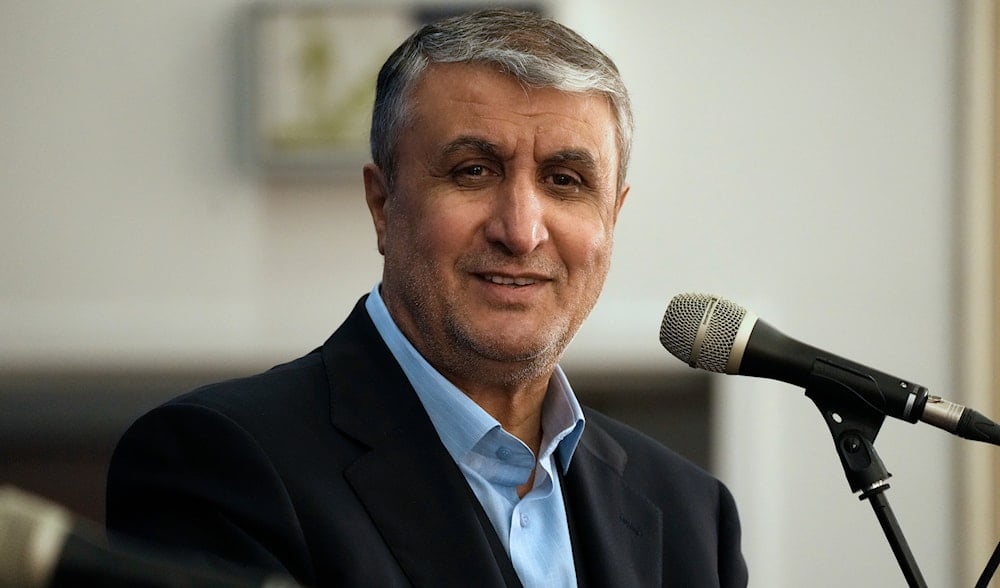Iran nuclear chief: Europe hardened stance after Iran-IAEA agreement
Atomic Energy Organization of Iran chief Mohammad Eslami accuses the West of politicizing nuclear inspections.
-

Head of Atomic Energy Organization of Iran Mohammad Eslami listens during his joint press conference with International Atomic Energy Agency (IAEA) Director General Rafael Mariano Grossi in Tehran, Iran, Thursday, November 14, 2024. (AP Photo/Vahid Salemi)
The head of the Atomic Energy Organization of Iran (AEOI), Mohammad Eslami, has accused European countries of adopting tougher positions immediately after Tehran reached a new cooperation agreement with the International Atomic Energy Agency (IAEA).
Speaking at the conclusion of his participation in the 69th IAEA General Conference in Vienna, held between September 15 and 19, Eslami said that instead of easing tensions, the recent deal prompted Europe to escalate pressure.
Eslami referred to the September 9 agreement signed in Cairo between Iran’s Foreign Minister Abbas Araghchi and IAEA Director General Rafael Grossi, which laid out modalities for renewed cooperation.
"European countries had consistently cited Iran’s cooperation with the agency as one of their primary conditions," Eslami said. "However, precisely from the moment the agreement was signed, we witnessed newer and more rigid positions from them."
He pointed specifically to France, Britain, and Germany, which have already notified the UN Security Council of their intention to activate the so-called snapback mechanism, a move that would restore all UN sanctions on Iran within 30 days.
Iran’s parliament had unanimously passed legislation requiring the government to suspend cooperation with the IAEA on June 25. The measure came after coordinated Israeli-US strikes targeted three Iranian nuclear facilities, attacks that Tehran said violated both international law and the Nuclear Non-Proliferation Treaty (NPT).
Eslami stressed that such assaults underscored the need to "define a new procedure within the safeguards system," arguing that current protocols fail to account for military operations against nuclear sites.
Call for safeguards against attacks
The AEOI chief emphasized that new inspection rules must be established to determine "how the inspection regime should operate" in situations where nuclear facilities come under attack. He noted that Iran is also bound by parliamentary law mandating a specific framework for its nuclear activities, which the IAEA must recognize.
Eslami also said Iran’s participation in the Vienna conference was necessary to confront "psychological, media, and political operations" by the United States and Zionist actors, who, he argued, are exerting extensive pressure on Tehran.
He added that Iran sought to use the platform to explain its position and highlight "the damages inflicted upon international law, the safeguards system, and the Agency."
On Monday, Iran submitted a resolution to the IAEA demanding a global ban on military attacks against nuclear installations, in response to the strikes carried out by the US and "Israel."
Iran's relations with the IAEA under Grossi
Tensions between Iran and the IAEA have intensified since Rafael Grossi assumed leadership of the agency in 2019, a period Tehran views as a turning point in the body’s neutrality. Iranian officials have repeatedly accused Grossi of aligning with Western and Israeli agendas.
In June 2025, following US and Israeli strikes on its nuclear facilities, Foreign Minister Araghchi accused Grossi of failing to condemn the attacks and of obscuring prior agreements. Soon after, Tehran barred Grossi from entering the country, citing evidence that sensitive Iranian documents had been leaked to Israeli intelligence.
Although a new framework was reached in Cairo on September 9, 2025, providing for renewed cooperation, Tehran has made clear that inspections will remain limited and bound by parliamentary approval.

 3 Min Read
3 Min Read










